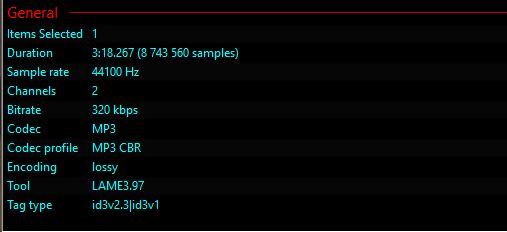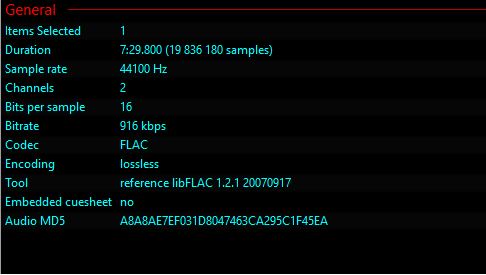I think that indeed they want to be part of the recording process. That is where the “we can fix the problems based on the individual microphone used” came from. Musicians record with known approved microphones so that their individual known idiosyncrasies can be corrected.
There’s a Stereophile piece that quotes ■■ as essentially stating his timeline to get the world’s entire music catalog to MQA is in months. Spotify’s catalog is mentioned, and he’s all “nah, Spotify pooh-pooh, we want to give the consumer everything, in MQA”.
Napkin math, Apple Music’s 50 million tracks, Spotify is 35 million, the average length of a track is 250 seconds, 50 million times 250 is 12500000000, there’s 31557600 seconds in a non-leap year, encode in real-time, and you’re talking something like 400 years if I’m not mistaken. So either ■■ is full of it with his roadmap, they’ve got a LOT of engineers on payroll (which if they do would be an order of magnitude bigger than what’s in their filing, something I’m certain British authorities would be interested in), or they’re doing batch. None of these are mutually exclusive, of course, but some make a whole lot more sense than others.
Also, since I might as well be petty, this simple math should give you all the information that’s necessary to assess the quality of reporting at Stereophile.
John Atkinson admitted on the “MQA is Vaporware” thread that it was this idea of a “Master of the mastering process - ‘end to end’” that was the context of his infamous “present at the birth of a new world” statement. In other words he also denies, in his own way, that MQA was ever about an innate/algorithmic sound quality improvement (i.e. so called “blurring”), rather about the most important aspect of sound quality - recording and mastering circumstances. Of course, he does not have Robert Harley’s (editor of The Absolute Sound) insight into what MQA is really about for the labels: DRM.
What is exceedingly odd about John’s reaction is the complete suspension of any sort of skepticism and fact checking. John Atkinson is not a newbie when it comes to the reality of the recording industry, process, distribution, etc. He had to know that the idea of a “end to end” would never survive the reality of the industry and consumers. Even if everyone agreed that it was in their best interest to give up so much into the hands of a few who stood behind NDA’s and a proprietary software/concept, how would such a thing ever actually be pulled off?!? It is true pie in the sky thinking…
Or start listening to MQA properly, rather than just speculating on what it does indeed sound like when it’s processed properly through both unfolds, and an MQA DAC.
The guy uses a Schiit Gungnir multibit DAC, and therefore has no credibility as far as listening to MQA properly is concerned.
That really is something is it not. The contradictions are endless…
Wait, everyone answers already I have to read first, pfft… Xekomi
Really Xekomi, compendium…
Napkin math, Apple Music’s 50 million tracks, Spotify is 35 million, the average length of a track is 250 seconds, 50 million times 250 is 12500000000, there’s 31557600 seconds in a non-leap year, encode in real-time, and you’re talking something like 400 years if I’m not mistaken. If you do this one by one you are right, I assure you they don’t.
Oh ye of little faith, I hope you perused the exquisite words of HiRes™ Audio(c)'s lord and saviour, where he explaineth to his flock how from the ancient master tape, he moulded a splendid rendition of the original, limitations of the master tape or independent null tests be damned.
(all sarcasm and MQA issues aside, it’s worth a read just for the advanced nerdom… I’d personally both trust Stuart’s description over the one at Steve Hoffmann, and be really curious to see another null test on that album, from the Onkyo source, if only because if what @Archimago described verifies, then it should be considered reasonably solid evidence Stuart is lying more than he’s ■■■■■■■■■■■■■ and if it’s the other way around, it’d be a good indicator that the “authentication” light is almost completely worthless. Yes, there’s a bit of “if she floats she’s a witch and she should burn” situation here, and I’d like to understand what’s going on exactly.)
Mp3 is Lossy. Flac for example is lossless, Or does foobar misinterpret this also.


If you take file_1.wav, encode it into file_1.mp3, encode that into file_1.flac, and make that .flac into file_2.wav you’ll have a lossy representation of the original file_1.wav, because of the file_1.mp3 step.
This is what’s going on.
Both MQA and Mpeg Layer 3 are “lossy”, and both can be “perceptually lossless”.
It took quite a bit of pushing and prodding, but ■■ is on the record saying it for MQA, and then spinning that into “perceptually lossless” to confuse non-technical users.
Another way to think about it is, which may be less offensive to the fragile of heart than comparing MQA to .mp3 is that, if you remember, one way to test if your computer was outputting bit-perfect data was to play back a movie track.
Both AC3 and DTS are lossy formats, but to be able to decode them, you still need to transport that lossy stream without changing anything to it - so, well, losslessly.
I assumed that ‘’ lossy and lossless’’ is about the file itself. So because you can’t exactly reproduce an MQA file it’s Lossy? The file itself is Hires, if you can’t change that, it doesn’t mean it’s Lossy, this is not “opinion” its a fact.
It’s OK, George W and crew tried to connect the dots as well…It’s tough!
This is indeed Lossy, you cannot convert it back to original anymore, simply because the data is gone. This was to make the file smaller and that was necessary due to HDD space and bantwidth via the internet. Flac is Lossless because it can be compressed as the file also becomes smaller, but this process can be converted back.‘‘bit exact’’
OK, I think we’re starting to breach Brandolini’s law here.
You assumed wrong (sorry).
That is (almost) correct.
Lossless: A => A’ => A
Lossy: A => A’ => A’’ (and so forth)
MQA, .mp3 and others are lossy, .flac is lossless.
To be a little bit rude: if you put a pile of ■■■■ inside a Hermes box, and give it to your significant other, you aren’t giving them a Hermes item, but you are delivering the content inside a Hermes box.
You’re mistaken.
I’ve given you Meridian’s own definition of “HiRes”, and explained to you why MQA doesn’t actually fit in it.
If you use a more permissive one, which is that “HiRes is anything above CD sampling rate and bit depth”, then, yes, you’d be right.
It also wouldn’t be a very useful definition, because I could destroy any amount of information, make the file smaller than CD, and tell you “hey, look - it’s HiRes”. For example, those lossy AC3 and DTS movie audio tracks from before would qualify, because they’re 16/48, but they’re still discarding way more information than well-done .mp3 (I’m obviously not talking about lossless DTS-HD here).
To go back to my rude example from before, if you take a Hermes handbag and wrap it into a Hermes box, and don’t damage the box, it will come out as a handbag.
If you take a Hermes handbag, put it into a shredder, then into a box, and loose a few pieces on the way, it’ll still be pieces of Hermes leather wrapped inside a Hermes box, it just won’t ever be a Hermes handbag again, no matter how good you are at sowing.
What you’re trying to argue is that a shredded Hermes handbag is no different than a folded (hehehe - see what I did here ?) Hermes handbag.
MQA is a shredder, pieces of leather get lost along the way, and ■■ argues that it’s better to have pieces of Hermes leather than a handbag. The FLAC butler carefully folds, and then carefully unfolds, to give you back your pristine handbag. Which would you rather have ?
And that is what MQA is doing.
I think the correct word to use is ‘processed’ rather than lossy. MP3 is lossy because it uses psychoacoustics compression. MQA ‘limit’ the amount of information above 16 bit in the audio range while assigning 8 bit of information above the audio range. MQA is actually a partially lossless system. The unfolding is not bit perfect but an approximation.
Think of passing a PCM to a DSP engine such as sampler and room correction; the end result is no longer bit perfect but in term of musicality, it correct certain shortcomings.
That one is yours. But digitally editing all the tracks of a song is called a “remaster”, so they should say “remastered” and they don’t…?
Totally “a different kind of lossy” than .mp3 is, but let’s not get too carried away with details here.
Lossy, lossless, the basics for right now, and let’s build from there once the vocabulary is acquired.
Yes, but how exactly is it doing this? By “limit” are you saying it is just a reduction in bit depth (which begs questions of course) - a decimation? If so, how do you know this? Bob himself uses the language of psychoacoustic processing, so without signing an NDA how do we know fer sur?
In any case I don’t believe it matters, you can’t A => A’ => A so it MQA is indeed lossy.